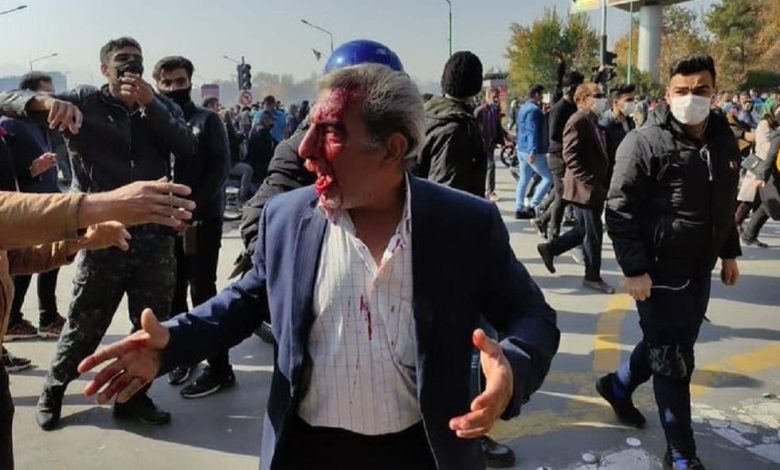Iran News Roundup: How the Regime Views Isfahan’s November 26 Uprising

FILE PHOTO
Written by
Hamideh Taati
The November 26 uprising of farmers and people of Isfahan struck the Iranian regime not by surprise but by anxiety. Even though officials and state media had been warning about “riots” for months, the inevitable came to pass and proved that if Tehran fails to come up with real solutions for the intertwined socio-economic crises, it can expect more unrest and upheaval from a nation sick and tired of the absolute rule of the clerics. Below is a round-up of several facts that have already been reflected in Iran News in Brief – November 27, 2021
The state-run newspaper Ebtekar wrote today: “The water crisis is strangling the country. Every day, another region rises up to demand its rights and shouts out. Social faults have awakened, and if not addressed, they will be getting more complicated by the day. The country is dealing with water bankruptcy. Mismanagement in the water sector is making the situation worse every day. No natural or miraculous event can change it.”
Mohammad Reza Mirheidari, the police commander of Isfahan province said: “Yesterday, a number of my colleagues were unfortunately injured because of the stones that were thrown at them. Sometimes these counter-revolutionary forces used explosives or stabbed the police.”
The state-run Kayhan newspaper wrote: “Yesterday morning, some thugs set fire to the police motorcycle, broke the windows of ambulances, broke the windows of public places, including the bank, set fire to trees and threw stones at the police, wounded one of the Basij forces, and so on. They created an atmosphere of terror for the passers-by.”
While asking for a harsher crackdown on protesters, Kayhan daily added: “Their action had nothing to do with the peaceful gathering of farmers that had ended. These riots reminded us of November 2019, where hired thugs had built several groups and were prepared for chaos and destroyed banks, cars, and mosques. The resurgence of these riots requires a more decisive disciplinary and judicial approach so that the enemy no longer dares to even imagine destruction and unrest.”
The state-run Vatan-e-Emrooz newspaper also wrote: “The activities of dissident groups who want to ride the wave of protests, can be seen as a prelude to the continuation of social discontent.”
During his Friday prayer sermon, Ahmad Alamolhoda, the supreme leader’s representative in Mashhad and Ebrahim Raisi’s father-in-law, said: “They [the enemy] are working and creating content to suppress our state by inciting people inside the country against the system. They are working on this invasion, on the attack that took place against our system, in order to rot the system from within, to dismantle the system from within.”
“Given the issues we have within our society, the enemy wants to incite an internal crisis, using soft warfare,” the local Khorasan TV quoted Alamolhoda warning.
Iran: Isfahan farmers resume protests, attacked by anti riot units
Mostafa Derayati, a state-affiliated political activist wrote in the Hamdeli newspaper today: “Those in the government think that such events [uprisings] will continue to take place, otherwise they wouldn’t have appointed so many military officials as governors. Hiring military figures as executive officials in different cities and provinces is probably based on this prediction because their expertise lies in these things.”
“However, people react in different ways that may occur at certain times. People will finally find a way. One way is to take to the streets. For instance, we are witnessing the problems of Isfahan now. It is true that water is the main issue, but people have other things in mind and water has become an excuse [for protest]. I believe that other grievances seem to have paved the way for these protests. When protests erupt, it can be difficult and costly to control,” Derayati added.
Mostafa Tajzadeh, former acting minister of interior, wrote in the state-run newspaper Sharq today: “We are witnessing an accumulation [of crises] in our country, namely environmental, climate, the spread of corruption and economic problems.”
“In fact, it’s the people who have taken to the streets and are protesting. You can’t tie them to foreigners, they cannot be called separatists… and most importantly, they cannot be appeased with a short-term ransom. These problems sometimes pop up from any corner of the country and we see a new form of dissatisfaction and civil protests,” Tajzadeh added.
The former official warned: “If we continue with the same approach, problems will increase by the day. Absent a strategic vision, in recent years, we have lost many opportunities to solve people’s problems and gain their satisfaction by looking at things through the lens of security and national interest. If we continue like this, it’s going to be dangerous.”
Iran News Roundup: How the Regime Views Isfahan’s November 26 Uprising

